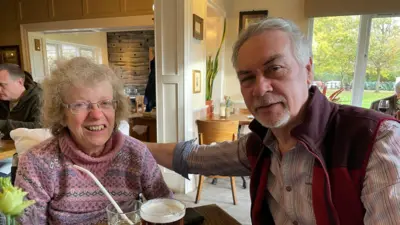We've updated our Privacy and Cookies Policy
We've made some important changes to our Privacy and Cookies Policy and we want you to know what this means for you and your data.
Councils putting stricter time limits on elderly care
- Author, Jane Hughes
- Role, Health correspondent, ґуПуґ«ГЅ News
Most councils are imposing unreasonably short time limits on care for the elderly at home, according to the UK Homecare Association.
In a survey, it found that an estimated 75% of councils expected carers to complete visits to elderly people in less than half an hour.
Ten per cent imposed time limits of 15 minutes.
The Association of Directors of Adult Social Services said it illustrated the financial pressures on the system.
Around 640,000 carers visit people in their homes across the UK on a daily basis, helping them with basic tasks like dressing, washing, and heating up meals.
But as budgets tighten, increasing numbers are being told to clockwatch; having time limits set on visits.
In its survey, the UK Homecare Association heard from 739 companies providing care at people's homes, representing 90% of all local authority areas.
<bold>Dignity compromised</bold>
Many said even when staff were carrying out the most intimate of personal care, they were given such strict time limits that it became difficult to protect people's dignity; a third had issued formal warnings about the problem to councils.
And six per cent said carers were sometimes under so much pressure that they feared people's safety could be compromised.
Many companies providing home care complained of councils driving down the prices they were prepared to pay for care, to the point where quality was affected and some carers were leaving the profession.
The UK Homecare Association suggested that excessively short time limits on visits might amount to institutional abuse.
Its chief executive, Bridget Warr, called on governments across the UK to ensure that everyone was able to get high quality care, and that enough funding was available.
"We need to consign visit times that risk the dignity and safety of elderly and vulnerable people to the past," she said.
The UK's largest home care provider, Saga, said the findings highlighted the need to change the way social care is paid for in the UK.
"Care is not just about old people - it's about families and loved ones," said Ros Altmann, Saga's director general.
"At the moment all these people are being let down."
The Association of Directors of Adult Social Services said until a sustainable funding solution was found things were unlikely to change.
Their president, Sarah Pickup, denied that price was the overriding priority.
"Inevitably in the current climate, commissioners are concerned about price," she said, "but that is not the same as saying it is general practice to put price above quality.
The government is expected to announce its plans for the system of providing care for elderly people and other vulnerable adults in England in the next few days.
The Department of Health said it had provided ВЈ7.2bn extra for adult social care services over the next three years.
"Commissioning care by the minute is unacceptable," said the Care Services Minister, Paul Burstow.
"The focus must always be on providing high quality, timely and dignified care - not on the time it takes to deliver it."
Top Stories
More to explore
Most read
Content is not available








